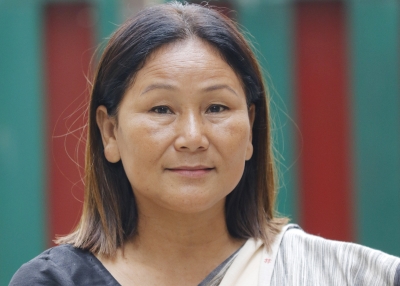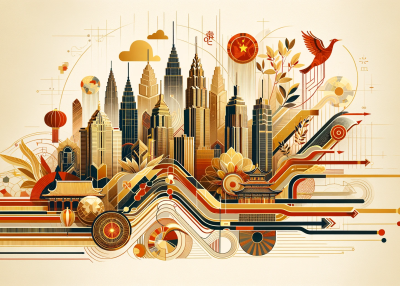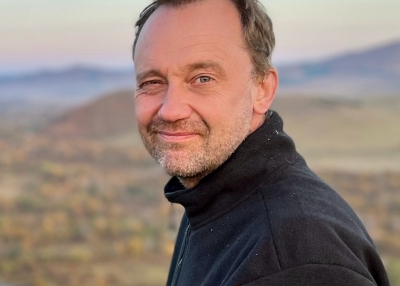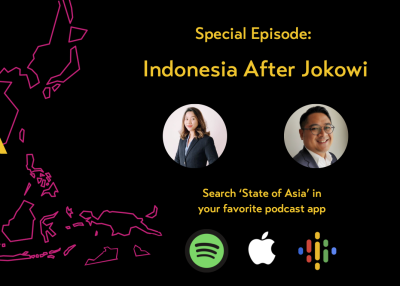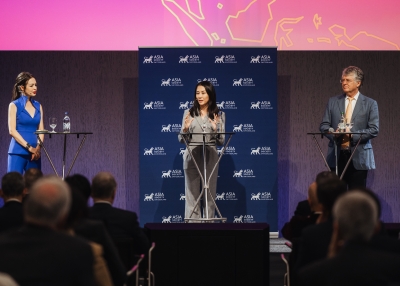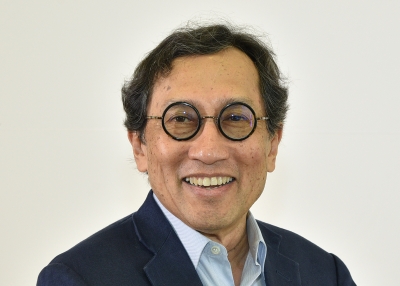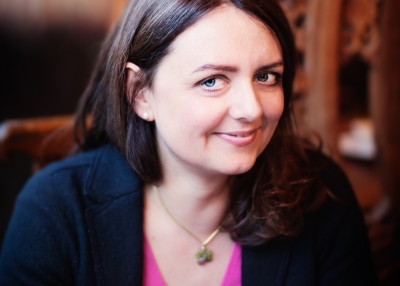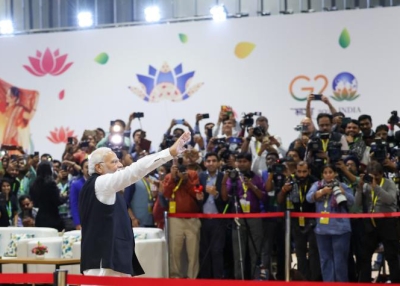State of Asia with Nalin Mehta
Exploring the broad appeal of Modi's BJP as India starts voting
GUEST ON THIS EPISODE
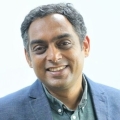
Nalin Mehta is a political scientist and journalist in Delhi, India, and author of The New BJP, a work you can only call THE book on the BJP, the largest political party in the world.
Under the leadership of India's Prime Minister Narendra Modi, the BJP has solidified its position as the uncontested center of power in the world's most populous country.
As India heads to the polls over a 6-week period beginning April 19, we talk with Nalin about how the BJP built and expanded its power base, and what Modi, who is all but certain to once again win the elections, could set as priorities upon starting his second decade as Prime Minister.
STATE OF ASIA podcast
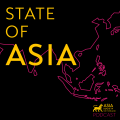
Season 6, Episode 2 – published April 16, 2024
Host: Nico Luchsinger, Executive Director, Asia Society Switzerland
Editor/Producer: Remko Tanis, Programs and Editorial Manager, Asia Society Switzerland
Find previous and future episodes here, on Spotify, Apple Podcasts, Google Podcasts, or search for 'State of Asia' in any other podcast app. We're also on YouTube.
Transcript
00:00:04 Nico Luchsinger
From Asia Society Switzerland this is State of Asia. My name is Nico Luchsinger. 2024 has been called a super election year with more than 50% of the world's population being called to the polls. The biggest election by far is in India. Of its 1.4 billion inhabitants, 950 million
00:00:24 Nico Luchsinger
Are eligible to vote in the elections for the lower House of Parliament, the Lok Sabha. The elections start this week and conclude on June 1st, with all results being announced on June 4. And just as an aside, the logistics of the selection alone are mind boggling.
00:00:38 Nico Luchsinger
There are 1,000,000 polling stations, 15,000,000 workers, and over 400,000 vehicles involved. Indian politics is always good for a surprise, but it is very likely that the coalition centered around Prime Minister Narendra Modi's BJP will win these elections, giving Modi a third term as Prime Minister.
00:00:58 Nico Luchsinger
He would be the first Prime Minister not from the Congress party serving a third term. And while there has been a lot of reporting on this story and political acumen of Modi himself, there has been a lot less focus on the party he leads, the BJP. That party has gone through a remarkable transformation in the last
00:01:16 Nico Luchsinger
years and is now the world's largest political party with over 170 million members. I visited the headquarters of the BJP in Delhi early last year and since then I've been wanting to understand the party and its success better and the book that everyone's been pointing me towards was written by a political scientist and journalist
00:01:37 Nico Luchsinger
Nalin Mehta.
00:01:38 Nico Luchsinger
It is simply called The New BJP and over more than 800 pages offers a magisterial account of the rise of the party. Meta looks at the party as a whole, its history, its ideology, its structure and organization, the way it broadened its voter base and the way it uses digital tools for communication.
00:01:59 Nico Luchsinger
It's a fascinating and wide-ranging book.
00:02:01 Nico Luchsinger
And Nalin Mehta joins me today to offer insights on the party that is likely to govern India for five more years, at least. Just a quick note before we get started, we had some technical issues and had to record this conversation in two parts. So Nalin and I might sound a little bit different towards the end. Nalin Mehta, welcome to State of Asia.
00:02:21 Nalin Mehta
Thank you very much Nico and lovely
00:02:22 Nalin Mehta
to be here.
00:02:23 Nico Luchsinger
So now in I think there's somewhat of a narrative around the BJP and Prime Minister Modi here in Switzerland and in the West in Europe that goes something like this. The main reason the BJP has risen into power and been able to stay there is due to the political acumen of Narendra Modi
00:02:39 Nico Luchsinger
himself. And because the BJP, you know, is pandering to Hindu nationalist sentiments and is kind of repressing democratic and civil freedoms. How accurate is this narrative that we seem to hear quite often?
00:02:51 Nalin Mehta
So I think this is a very simplistic narrative. I think it's a narrative that's very easy to propagate because it kind of fits many people's mental maps. But what's happening in India with the rise of the BJP, with the rise of Hindu nationalism and of course, the enduring electoral popularity of Narendra Modi as Prime Minister who
00:03:11 Nalin Mehta
is now finishing ten years in power.
00:03:13 Nalin Mehta
As Prime Minister, he's been in elected office for over 20 years now and he's yet to lose an election that he's fought in the last 20 years. Now the simple fact is that the narratives
00:03:26 Nalin Mehta
with the liberal intelligence here in India as well as with the global intelligence here and during the New York Times, for example, it is that
00:03:35 Nalin Mehta
this is a rise of a xenophobic populist leader and of an ideology which is taking India back into autocracy, and so on. And I think at the heart of this narrative is that there's something wrong with the electoral victories.
00:03:47 Nalin Mehta
I think the fact of the matter is #1, there's no question that Narendra Modi has been the harbinger of change for Hindu nationalism and its electoral popularity in India over the last 10 years. No question about that. The BJP used to be among the two most important political parties in India before 2014.
00:04:06 Nalin Mehta
It is by far the single most important political party in India. It is also by far the single largest political party in the democratic world. The only other party that was bigger than the BJP till recently was the Chinese Communist Party. But that doesn't count because it's not in a democratic system, but the BJP is now bigger than the Chinese Communist Party
00:04:26 Nalin Mehta
in size and that is important when you put this in context. The Chinese Communist Party.
00:04:32 Nalin Mehta
exists in a state which is a one-party state. The BJP exists in a state where over 50% of India still did not vote for BJP and Narendra Modi in the last election. In a country which is of multi-party democracy, that's number one. Number two, I think it's too simplistic to say that this is entirely because of Hindu nationalism.
00:04:52 Nalin Mehta
There's no question that Hindu nationalism is at the heart of the BJP's ideology. There's no question that the BJP stands for an unapologetic hinduness. If you like, of strong nationalism and of an idea of India which is different from the idea of India that preceded it, there's no question about it.
00:05:11 Nalin Mehta
However, the fact of the matter is that the BJP has been winning not because the core constituency of Indian nationalism has increased. What has happened is it's been winning because the BJP has been getting many more unaligned voters cutting across gender, class, geography and caste.
00:05:31 Nalin Mehta
So for example, since 2014, the BJP has won more election than it ever did before 2014. And even when it lost
00:05:39 Nalin Mehta
elections it has done better in them than it did before, and the reason for that is that the BJP in North India, for example Hindi speaking North Indian states, they constitute the a significant majority of these.
00:05:52 Nalin Mehta
BJP has become by far the predominant party of the village in North India. It's also become the default party of the poor in North India, which is very different from the 2014 BJP, the old BJP, as I call it, used to be a party which was a party of urban India.
00:06:12 Nalin Mehta
It was a party of people in the towns, not in the villages of upper castes, not lower
00:06:18 Nalin Mehta
castes and of the rich and the middle classes, it wasn't the party of the poor. It wasn't the party of a much wider social diversity. And it wasn't the party of the village. The BJP post 2014, which is the new BJP which Narendra Modi has kind of created, is by far the most socially representative party in North India.
00:06:39 Nalin Mehta
Barring Muslims, and that's an important exclusion because large numbers of Muslims do not vote for the BJP. But keeping that aside for a second across caste, class, gender, the BJP is has been getting more votes than any other political party and that is not because of cultural nationalism. It is because
00:06:57 Nalin Mehta
of other issues, it is because of things like the creation of a new kind of a welfare state. It is because the creation of a new social welfare delivery system, which has been enabled by technology, is the coming together of a unique ID system, a phone mobile revolution in India and a rewiring of the Indian welfare state
00:07:18 Nalin Mehta
as we know it and the bringing into the welfare net of large amounts of people that were completely outside of it and that importantly, it's also because of gender.
00:07:29 Nalin Mehta
More women in India today vote for BJP than for any other political party, which is completely different to 10 years ago. Historically, in India for about till the early 2000s, women mostly voted for the Congress and not for the BJP. That equation has changed completely.This is why the BJP is rising to pin it down just to one person.
00:07:49 Nalin Mehta
Or to pin it down to just cultural factors
00:07:53 Nalin Mehta
would be simplifying it to the point that it won't make any sense.
00:07:56 Nico Luchsinger
Thank you very much and you've already, I think, covered a lot of ground, the incredible book that you've written, achieved is that it's the very clearly teases out all these different elements that have contributed to the BJP's rise and would love to go a little bit deeper on some of them. You quote a BJP official in the book, who says Hindu nationalism may have been something that has helped
00:08:16 Nico Luchsinger
accelerate the BJP’s rise. But the real drive was to focus on welfare
00:08:20 Nico Luchsinger
and I'd be curious to hear from you focusing on welfare seems like a fairly obvious political strategy to win elections, especially, you know, in, in, in countries where there's still a relatively large share of the population living in poverty. But it's one thing to want to do that, and then it's another thing to actually do this successfully and turn it into electoral success. So what was the key success factor in the BJP's
00:08:41 Nico Luchsinger
focus on welfare. How did they do it, and how did they do it in a way that helped them politically?
00:08:46 Nalin Mehta
All governments spend money on development in the developing world. The BJP is no different. What has happened is the delivery mechanism has changed completely and that changes everything. And let me illustrate this a little bit. In the 80s, Rajiv Gandhi, the former Congress Prime Minister, he famously argued that for every rupee of development aid that goes to the poor.
00:09:07 Nalin Mehta
Only 15 paisa of that rupee reaches the poor, 100 paisa makes a rupee only 15 of that hundred would reach the poor. The rest would be lost in between in transit due to corruption to different levels of governmental bureaucracy.
00:09:20 Nalin Mehta
Now what has happened is that the Mr. Modi's government and his politics has benefited significantly from the coming together of the unique digital ID system of a phone revolution in India and cheap data. What happened is that India, as you know, has the single largest unique ID system in the world called Aadhar.
00:09:41 Nalin Mehta
About 1.4 billion people have digital ID systems, which didn't exist before. This would have meant nothing on its own. If we didn't have a mobile phone revolution. So almost every Indian now has a mobile phone. Almost every Indian and data costs, by the way, data consumption in India is
00:09:56 Nalin Mehta
per capita is more than any other country in the world. It's more than North America. It's more than Western Europe and it's at the cheapest rates in the world. So that allowed the poor to access, keep data on the Internet in a way that just wasn't thinkable even five or six years or seven years ago. That number one now keeping that in mind
00:10:17 Nalin Mehta
what Mr. Modi did when he came to power and this precedes
00:10:21 Nalin Mehta
Mr. Modi coming to power and the government that preceded him between 2009 to 2014, the unique ID system was created by the Congress government of that time along with Nandan Nilekani, who's one of the IT Tycoons of India, who created and co-founded the IT company, Infosys. It was created at that time both as a security
00:10:41 Nalin Mehta
tool as well as a tool possibly for social welfare and other digital ID system. What happened with that was that Mister Modi, by the way, had publicly opposed that system money with the Chief Minister of the province
00:10:52 Nalin Mehta
of Gujarat before he
00:10:53 Nalin Mehta
became Prime Minister, by the way. The Congress had started a pilot
00:10:58 Nalin Mehta
for direct benefit transfers of welfare money to the poor in 51 districts of India before it lost power and the idea was that instead of developing money going to different schemes to people or through different layers of government bureaucracy where it was prone to be siphoned off due to corruption, the idea was that
00:11:17 Nalin Mehta
the money could go directly from the governments bank into the people's pocket through the mobile phone, through the through an online transit.
00:11:25 Nalin Mehta
Now there were two or three problems in this idea. The first problem was that India did not have financial inclusion. 80% of Indians before 2014 did not have a bank account. So even if you identified all of them, they would. You give them the money, you couldn't transfer it digitally, right? Didn't have a bank account. So that was the first problem. The second problem was that the Indian state had no way of identifying the poor.
00:11:46 Nalin Mehta
You know, with exactitude it knew roughly how many poor there were. But the problem always was how to reach them directly, which is why a lot of money used to get siphoned off.
00:11:54 Nalin Mehta
What the digital ID system did was it allowed India to 1st create financial inclusion. So between 2014 to in about a three to four year period, India brought into the banking system about 550 million people. People who never had bank accounts and that meant that financial inclusion in India went from 20-25%
00:12:14 Nalin Mehta
to about 80%.
00:12:16 Nalin Mehta
No other country in the world has seen such a large shift in financial inclusion in such a small period that happened, basically because this coming together with cheap mobile phone, the cheap data and the unique ID system allowed the state to issue a directive with the Modi date that was his first action after taking power in 2014, and that allowed people to join the.
00:12:36 Nalin Mehta
System and then the state could have a way of reaching.
00:12:39 Nalin Mehta
The second thing that Mister Modi did was that he put his entire political capital and remember, he won 2014 with a huge massive majority. The first time a political party had won absolute majority in our parliamentary system in in over 3 decades was in 2014. Mr. Modi was the 1st Prime Minister in over 33 decades, who won an absolute majority of
00:12:59 Nalin Mehta
his own in 2014, and he repeated that with an even bigger majority in 2019, and now we're heading into a third election in 2024. Now in between 2014 and 2019, when these bank accounts were created, he also put his political might behind direct benefit transfers and what that meant was I'll give
00:13:16 Nalin Mehta
numbers the number of beneficiaries was only 100 million in 2013-14. That went up to 748 million in 2022-23 in the people who received government aid directly into their bank account. If you are on social welfare in the US, you still largely, my American friends tell me, you still largely get money to a check.
00:13:37 Nalin Mehta
So this is what India did in a four or five year period. So at one level the government saved over $27 billion by savings across government schemes at another level, billions of dollars of money reached people's pockets. And I'll give you an example of what this means. And this example includes gender.
00:13:54 Nalin Mehta
Which is very important because women voting is fundamentally crucial to the rising political fortunes of the BJP. The government started a scheme for housing for the poor. Millions of people in India who are poor below the poverty line did not have their own houses, so they were living in, you know, in shanties or they were living in
00:14:15 Nalin Mehta
houses that were made of brick. So the government said we will create a scheme where we will provide you X amount of money to build a house, but we will not build a house for you.
00:14:27 Nalin Mehta
In there were previous schemes also before this that used to have that used to provide housing to the poor. In fact, the critique of the government opposition has often been that Mister Modi didn't do much. The critique has been that look, they just he just changed, took older schemes, gave sexier names to those schemes and publicize them better. So this whole thing is a kind of myth. Now that
00:14:47 Nalin Mehta
is not true. Between 2014 to 2019
00:14:52 Nalin Mehta
20 million plus houses were built in India by the poor through money that came to them through their mobile phones from government funding. Similarly, over 165,000,000 toilets were built. Now this is very important because one of the Mr. Modi's two signature schemes was free housing for the poor and the second was toilets. Many villagers in India do not have
00:15:14 Nalin Mehta
toilets in their houses. So women have to go into the fields for bathing or for going to the washroom. And there was a lot of issues of sexual harassment in that in the open field.
00:15:24 Nalin Mehta
Now when hundred 165,000,000 toilets are built, how are they built? The money is sent to the account of these women who never had bank account before and they make the toilets themselves in their own house. So that completely changed gender equity in the ground in many places. And the other point last point I want to make is these 20 million houses that were built the government mandated.
00:15:44 Nalin Mehta
India is deeply patriarchal.
00:15:47 Nalin Mehta
As we know, by all gender data tells us that this is a country which did not have inheritance rights for women until 20 years ago. For example, if my parents passed away and I had a sister, I would inherit the house from my parents, not my sister. She would have no right on my parents house in the way that I would have.
00:16:04 Nalin Mehta
Only in the early 2000s, the Supreme Court of India gave that right to my sister. But that right was given for people whose parents died from that date onwards. It wasn't for people whose parent died before that.
00:16:14 Nalin Mehta
Now only two or three years ago, that right was given to all people when their parents died in such a patriarchal country, the Government of India mandated that these houses, which have been built for the poor, they will be the preference, will be given to women, not to men. So what happened was that out of the 20 million plus houses that were built, 68% of that 20 million happened to be in
00:16:34 Nalin Mehta
registered in the names of only women alone or women jointly with their husbands. Imagine.
00:16:40 Nalin Mehta
Put 13 to 14 to 15,000,000 women who had very little voice in their home in the village. In a deeply patriarchal society. Now getting a house which they've never owned and they are the owner of that house and not their husband. It changed the power equation socially in many ways. This was a huge step for gender equality.
00:17:00 Nalin Mehta
Now a significant proportion of these women who got houses registered in the name like.
00:17:04 Nalin Mehta
That I think it's it's reasonable for a lot of them to try and vote with the BJP at least once to see what has happened because the BJP then also mobilize political opinion by reaching out to people below the poverty line and saying, look, we gave you this housing, this creation of a new kind of welfare state, which was significantly more efficient than the welfare state that preceded it.
00:17:24 Nalin Mehta
I think it's very much at the heart of the BJP's growth as a party of the village and of the poor.
00:17:29 Nico Luchsinger
Thank you. One thing that I think for the first time you've actually shown in your book through
00:17:34 Nico Luchsinger
what I can only imagine was very tedious data analysis is that the BJP also expanded in terms of the casts from a much broader background and there's a lot more representation of lower cost than there used to be. The BJP was actually known kind of as an as an elite upper cost party. And again here it's kind of obvious that the political party who strives for power
00:17:55 Nico Luchsinger
would want to
00:17:56 Nico Luchsinger
do that. But what I'm fascinated by is that it seems that the BJP was able to expand its appeal and its representation among lower castes without experiencing the backlash from the existing party elite and the upper caste. It was able to broaden the tent without paying a price for it. How did it do that?
00:18:14 Nalin Mehta
So like you said, the BJP before 2014, the old BJP was an upper caste party. It was a party of the
00:18:21 Nalin Mehta
elites it was largely an urban based party. What the BJP did was that after Modi comes to power and in fact part of is and along with Amit Shah was the Home minister and Mr. Modi's Lieutenant. What they did was what we found in our research was something that I didn't expect. I'm a political junkie. I followed in politics all the time. But this is something I didn't expect to find. In fact, I didn't believe my own data
00:18:43 Nalin Mehta
when I first saw it, because what we did was we studied the social profiles of Members of Parliament elected to India's Parliament from different political parties over a 40 year period from 1970 onwards till 2020.
00:18:57 Nalin Mehta
Then we looked at the party organization of the BJP at the district level, down to the lowest level to see who are the people who have positions of power and influence within the parties, hierarchical structure. And then we looked at the people who, after the party came to power, who were the ones who got the spoils of power. So who I who became ministers so parties can promise many things to many people.
00:19:19 Nalin Mehta
But after they come to
00:19:20 Nalin Mehta
Power, who do they reward? Did they just make empty promises or did they actually to include people in the social tent, as you called it? Or did they then give these people an equal share in power or not? That was the idea to study it across all these matrices and what we found in the data completely stunned us. It was that, contrary to the old stereotype of the BJP,
00:19:40 Nalin Mehta
what the BJP did was that after 2014, the BJP systematically
00:19:44 Nalin Mehta
went and significantly increased the participation of three kinds of the Dalits, which is the former untouchable caste in in India. At one level, the 2nd is of something called the other backward.
00:19:58 Nalin Mehta
What the BJP did was that it systematically went to the guys in the middle, the guys in the lower, lower middle and the guy at the bottom of the table and the old traditional cast hierarchy table. And he told these guys look, hey.
00:20:10 Nalin Mehta
We will give you a stake in our system. And why don't you join us and we'll give you positions of power. So now this is a very difficult thing for the BJP to do. Because if you see Indian politics for the last 70 years now, there was a after independence in the 1940s, the Congress Party dominated Indian politics for the longest time. And the Congress party was a social umbrella.
00:20:31 Nalin Mehta
With the party of the Freedom Circle against the British, it had a social umbrella tent where almost everybody, every walk of life, every religion, every caste, was part of the Congress. So it was, it was like a hold all party for everybody.
00:20:43 Nalin Mehta
When the Congress party declined, it was replaced not by another party that was similar to it for the for between the early 1990s to 2013, fourteen, which is the period before which precedes the BJP coming to power. In that period, there were largely 2 forces were controlled in politics. One was the rise of Hindu nationalism. As one poll, it wasn't very dominant.
00:21:04 Nalin Mehta
So it was. It was a rising axis of power where people who identified themselves as Hindu, culturally and politically started moving towards the BJP, but they were largely restricted to the upper classes at that point or the upper caste. And then the second poll was the rise of the caste-based parties, the parties of social justice and these parties basically argue.
00:21:22 Nalin Mehta
That over so many years of independence, while we may have had independence in multiple levels, the old Congress system basically still continued the old caste hierarchies and the lower caste. Those would lower down the traditional order, never got the political due. So these parties were organized on the axis of caste, but the BJP mobilized on the axis of religion and culture. And then there was a Congress.
00:21:42 Nalin Mehta
Which claimed to be the party of everyone. So there were these three basic polls, and there was a fourth pole which was regional sub nationalism if you like, because India got many languages in many States and their parties who kind of espoused the local regional sub nationalist interests of those regions, these are the four kinds of broad divisions in India.
00:22:00 Nalin Mehta
What the BJP did was in north and North India, which is the base of the BJP's power in North India, the power was basically it was the caste-based parties and the parties of which espouse social justice, which largely were winning many of these seats at the expense of the Congress. What the BJP did was it went to the supporters of the caste-based parties and told them.
00:22:20 Nalin Mehta
Said look
00:22:21 Nalin Mehta
you guys have been hoodwinked for 30 years in the name of giving you more power. The leaders of these parties have essentially become feudal family-owned parties and actually they never give you power. The BJP basically said, look, we will give you power if you come to us and what we found in our research was systematically at every level of political
00:22:42 Nalin Mehta
power at the level of party organization at the level of people who are given tickets at the national and provincial levels at the level of people who then made ministers after they win elections.
00:22:51 Nalin Mehta
The BJP significantly increased the share of people from these communities to somewhere which is close to the population average of these communities. So what that meant? And the amazing thing and this was it did this without losing the support of the upper caste, who remained with the BJP. And it also did this. So this was at the center of the BJP increasing into rural
00:23:12 Nalin Mehta
India and that was crucial to its growth. The BJP by far became the most socially representative party by caste in North India at every level of political power that matters in North India.
00:23:26 Nico Luchsinger
You've outlined really well knowing how the BJP has been incredibly successful in expanding from what used to be an elite upper cost party into all different sorts of classes and costs. But that does back the question. Also looking at the example of the Congress
00:23:42 Nico Luchsinger
Party going forward, can the BJP make sure that it serves the interests of all the people that are involved in the party or will it be torn apart by diverging interests of stakeholders?
00:23:54 Nalin Mehta
There's no question that this is going to be a challenge for the BJP as it grows bigger and bigger, but that really is a test of its leadership. So far, we've already seen signs of some of these challenges, but so far the current leadership led by Modi has managed them adroitly, but under a weaker leadership,
00:24:14 Nalin Mehta
When the wheel of electoral fortune changes,
00:24:18 Nalin Mehta
and the leadership is not as secure at that point, then these issues will become more and more cute. So at the moment, for example, one of the reasons why the BJP can manage to override some of the tensions of tussling or the tussles for control between different factions is that
00:24:38 Nalin Mehta
Because the BJP is still growing,
00:24:41 Nalin Mehta
still winning elections constantly, so that allows the leadership to paper over the cracks that may or may not appear a little bit, simply because leadership is still giving more to the party than it's taking from it. But as and when the wheel of Fortune changes then these challenges will become more acute.
00:25:02 Nico Luchsinger
We started our conversation with you, arguing that this idea that Hindutva, Hindu nationalism is the the central, or even only reason for the BJP peace rise. It's way too simplistic. But I do wanna come back to this topic because India is central to the BJP.
00:25:16 Nico Luchsinger
And you described it in the book as sort of as the antithesis to the neruhvian idea, whereas Nehru wanted to build a new India influenced by Western ideas, the BJP and its predecessors focused on what you call rebuilding India based on its own heritage and traditions. So with the BJP now firmly established as the leading party in India, as you've outlined and the country itself playing a
00:25:37 Nico Luchsinger
much more important role globally. What does that mean for the priorities of what is a very, very likely third term of the Modi government? What will they focus on and what would they like to achieve in the next five years of government?
00:25:49 Nalin Mehta
So I think one of the big priorities for the government will be economic growth.
00:25:55 Nalin Mehta
First and foremost, India's already the 5th largest economy in the world. Mr. Modi has set a target for India, becoming the third largest economy in the world. The focus on that, a focus on much more investments. That's one. Secondly, I think in cultural terms, we will see a deepening of the focus on culture as an ID.
00:26:15 Nalin Mehta
Essentially.
00:26:16 Nalin Mehta
This is an unapologetic cultural nationalism, a focus on nationalism and India that will be significantly upfront globally in its diplomacy as its global heft rises, it will be less apologetic about than it has been in the past for multiple things and very vocal about it, about its concerns.
00:26:36 Nalin Mehta
Which is also a sign of its rising confidence, but also it's that messaging is both global as well as internal because it's meant to also show showcase certain kind of strength
00:26:45 Nalin Mehta
to its internal audiences.
00:26:46 Nico Luchsinger
Excellent, Nalin Mehta. Thank you very much for joining us on
00:26:49 Nico Luchsinger
State of Asia.
00:26:50 Nalin Mehta
Thank you very much, Nico. Great pleasure to be here.

